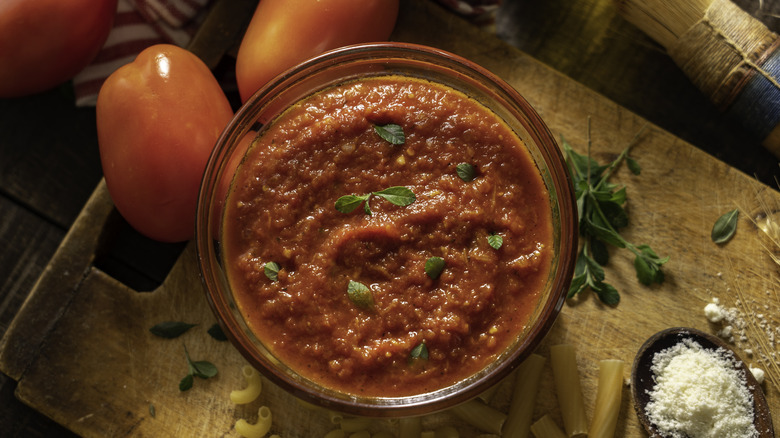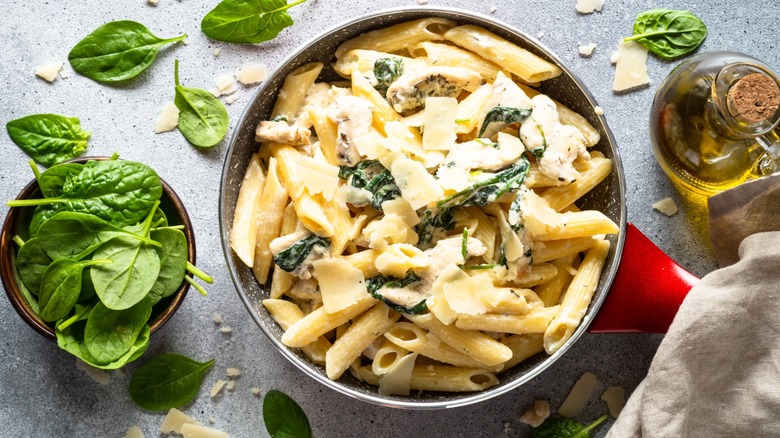The Easiest Way To Thicken Pasta Sauce Whether It's Creamy Or Tomato-Based
There aren't many people out there who will turn down a nice pasta. The same can't be said, however, for pasta sauce that's just too thin. It's a tragedy to think of a delicious pasta done perfectly al dente, only to be smothered in a watery, thin, unappealing sauce. It's safe to say that no one wants that. But don't worry just yet — this sadness can be avoided, no matter if you're using a cream or tomato-based sauce.
With a couple of simple additions, you soon won't have to worry about your pasta sauce being too runny. As it turns out, if your luscious tomato sauce is a bit too thin, all you need is a few spoonfuls of tomato paste. And if you're cooking with a cream-based sauce instead, simply add some grated cheese of your choice (though a sharp parmesan or pecorino would work wonderfully with traditional Italian dishes). You could even substitute this cheese with a white bean purée for a thickening agent with a more neutral flavor profile. This could be important if you cook your pasta in liquids besides water, but both are worth experimenting with.
Be careful not to overcorrect
Although there are many different tips to make homemade pasta sauce, you should always strive to create a sauce that's perfectly balanced, both in texture and taste. This is why you should pay attention to how your sauce might change depending on what you add to it. At first, you might assume that tomato paste wouldn't do very much to alter the taste of an already-tomato-based sauce, but you would be mistaken. Since tomato paste is just concentrated tomatoes, the flavors of the tomatoes are greatly amplified. Specifically, the deceptive sweetness of tomatoes is turned up to 11 in tomato paste, so you'll want to add only a little at a time to avoid throwing off your flavor balance. If you find your new sauce a little too sweet, you can offset this with an acid and/or salt ingredient.
As far as cream-based sauces go, you'll want to be just as vigilant to avoid throwing off the flavor balance. Making a white sauce out of cheese is quite common, such as in a classic cacio e pepe, but too much cheese can overpower your sauce. Although white bean purée is certainly more neutral in flavor relative to cheese, its earthy, somewhat nutty flavor can still overtake other delicate flavors in your sauce if you use too much. Luckily, you likely won't need much of either to add some thickness to a cream-based sauce.
The art of a perfectly-thick pasta sauce
While you may be concerned with pasta sauce that's too watery (and rightfully so), you shouldn't forget the importance of adding water when combining pasta and sauce, especially if you finish the pasta in a pan. Having water in your sauce, especially pasta water, is often an important step in the sauce-making process, and, with some patience, your sauce will thicken naturally as it reduces in your saucepan.
That said, it's also completely understandable if this reduction either takes too much time for your liking or doesn't thicken your sauce enough for you (particularly if you've accidentally added a bit too much water). Tomato paste, cheese, and white bean purée are surefire ways to thicken your sauce, but they're by no means the only ones. Adding heavy cream can be an interesting option, no matter whether your sauce is tomato or cream-based. You could also consider adding a cornstarch slurry as a potent thickening agent when finishing your sauce. Where there's pasta, there's a chance of a too-thin sauce, but with a number of tricks available, a runny pasta sauce can be considered a thing of the past.


